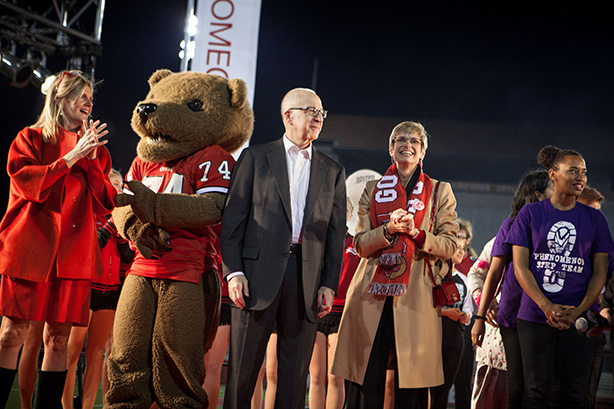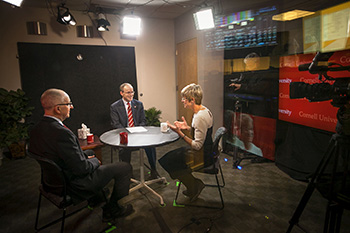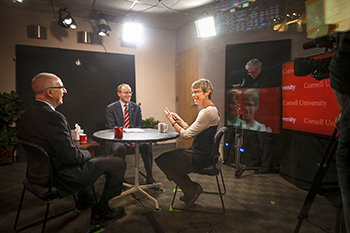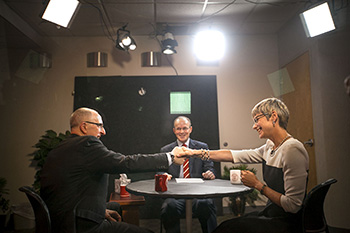CORNELL AT 150

President David Skorton and President-elect Elizabeth Garrett at Cornell's Homecoming Weekend in fall 2014.
As Cornell celebrates 150, Skorton and Garrett look to the future
David J. Skorton, Cornell's current and 12th president, and Elizabeth Garrett, who will become Cornell's 13th president July 1, sat down with Joel Malina, Cornell vice president for university relations, in February to discuss the challenges facing higher education, what it takes to be a successful leader at a top research university, Cornell's sesquicentennial year and the future of the university. The full conversation is available on video on CornellCast. Excerpts from their conversation:
David Skorton: I just want to tell everybody out there who's looking at this and those who are reading this how thrilled I am with "Lucky 13." The search committee and the board of trustees did a fabulous job, and I want to say to all the folks who are going to read this: You're going to really enjoy the leadership of Elizabeth Garrett. Welcome to Cornell.
Elizabeth Garrett: Thank you so much. And it has been great fun to get to work with David during this transition and … to think about our future together. I feel enormously fortunate to be following in the footsteps of a leader like David, so thank you, No. 12.
On the most important traits, and the role, of the president of a major research university:
Skorton: I'm a big believer that universities, and actually many big organizations, thrive from the bottom up. Top-down sort of leadership and management doesn't usually fit with this paradigm. So I think vision is No. 1. And I've learned by making some mistakes over two presidencies that the most effective tool a president has at a successful research university like Cornell is persuasion. And that persuasion has to be based on a vision that could be compelling enough to bring people along, no matter what part they play in a complex organization. Sometimes, unfortunately, people will not come together in an organization like a research university. And so the other thing I would add is that the president has to occasionally be very decisive and have the courage of her convictions to push forward – despite sometimes the lack of a total consensus – especially on difficult issues.



From left, David J. Skorton, Joel Malina and Elizabeth Garrett discuss the future of the university at the Cornell Broadcast Studios in Collegetown in February. See larger image
Garrett: I agree with David that vision is the most important aspect of presidential leadership, and that vision comes from conversations with the constituent groups: with the faculty, the staff, the students, the alumni. And it's the president's role to bring those groups together to think about their ambitions, their hopes and aspirations for the future, and then articulate that for the institution in a way that captures all of those desires and ambitions and hopes. … A president cannot succeed unless he or she has a terrific team of people. [A university] is a complex organization, and Cornell is particularly complex with its hybrid nature of public aspects [located] in a private liberal arts research university, dedicated to the very best teaching, with a wide geographic presence … throughout the world.
Skorton: In a college town like Ithaca, we're the largest employer by far not only in the city, in the town, but the county. [It's] very important to be on a listening tour constantly in the community beyond our walls. Everyone in a place like Tompkins County is hugely affected by Cornell University decisions and actions, whether or not the individual actually works for Cornell.
On advice for the new Cornell president:
Skorton: My main advice to No. 13 is, don't worry too much about what No. 12 did. Cornell is a gentle place, the Cornell community is a very gentle community, very emotional and sentimental about their leaders. Hopefully, not too sentimental while they're in office. … So the one piece of advice, the most important piece of advice, is to have the courage of your own convictions, do your own thing … The second piece of advice, and it's really just a reiteration of what Beth already said, is the development of a vision based on … listening and digging and asking questions and being responsive to constructive criticism … always to be on a sort of listening tour as you're slugging out the day-to-day issues. Those will be the two main things. Do your own thing and constantly listen.
Garrett: This transition period is really a gift to me. Very few academic leaders have the opportunity that David has made possible for me: to really spend time meeting people, listening, getting a sense of the culture, of the aspirations. Usually you're named and then, a few weeks later, you're in the job, thrown in and making those kinds of decisions that David talks about. And so, … this [is] an enormously important time for me as I think about the next steps for this institution, building on the terrific foundation that David and so many before him have laid for all of us. … I've traveled around meeting [students, faculty, staff, alumni]. I'm going to continue to do that until my husband and I move here July 1st. … One of the things that has amazed me has been the … deep enthusiasm for Cornell by all of those constituencies. … What impresses me about Cornell's alumni is not only their deep love for this institution, but when they talk about their years – and as faculty members, I think this is going to resonate for us – they mentioned particular faculty members and particular classes that made a difference in their lives. … To have them talk about actual classes … makes someone who is a professor at heart really feel like this is the kind of place that we want to continue to nurture and to move forward.
On the Cornell alumni network and alumni passion for the university:
Skorton: I've been in a lot of universities with fabulously effective and excited alumni pools – UCLA, Northwestern University, University of Iowa. I have to say, I've never experienced the kind of connection that people have to [their] alma mater that I have at Cornell. … The phenomenon of Reunion Weekend, which I went to for the first time before Robin and I actually started on the Cornell payroll in June of '06, … it was absolutely unbelievable. And the highlight for me every Reunion Weekend is Cornelliana Night where people sit in Bailey Hall, one of our big performing arts and lecture venues, and talk about Cornell, sing songs. … It's really, really, really amazing.
And when you ask, how do we tap into it? … I think it's respecting the alumni. As Beth mentioned earlier, when she was ticking off the constituencies at the beginning of our discussion, she said "faculty, staff, students and alumni" – she just kept them all together, and that's the answer. … To consider the alumni part of the community, part of the decision making, part of the forward planning – not only as a means of support. And we do get unbelievable support from alumni, not just financial support but political support, moral support, all kinds of support and constructive criticism. … If the alumni feel that we are considering them part of the grassroots that plans and lives the university, they get even more engaged. And one of the things that I've learned through your predecessors and through my work with you, Joel, is that adding on a few minutes of Q&A at the end of even a very formal speech opens the door not only to those few minutes, but to folks emailing you afterwards, because maybe you took three questions and there were 20 that didn't have a chance to be asked. And I have gotten so much wonderful, wonderful input from that. Sometimes I disagree with it, what's the difference? It's the interaction. … Really taking them seriously. To me, that's the secret … taking that unbelievable engagement and even ratcheting that up a bit.
Garrett: I agree with all of that. … I would add [that] the other thing that has amazed me about the alumni is their attachment to the current students and faculty. … Joel and I were together in Washington, D.C., and we visited our great alum [Justice] Ruth Bader Ginsburg ['54] at the Supreme Court. I had known her when I clerked on the D.C. circuit … So, we were just going in to talk to her but it turned out that the Cornell Glee Club was performing at the Supreme Court. And that was wonderful. … The thing that was special to me is [that] Justice Ginsburg took our students and gave them a special tour … and I watched these students, … from freshmen to seniors, watch her and engage with her and I watched her share her knowledge and her love of the court, of the law, of Cornell and that special bond – there was just something magical about that. [She] was a slight person surrounded by these young men all hanging on every word that she said, and that to me was that kind of connection. … [S]ome of our students may be able to envision themselves someday standing in her place. … I felt I was fortunate to get to be part of it.
On legacy and how Cornellians in 2065 might look back on the Skorton and Garrett years:
Skorton: Well, they'll be shocked to know that Billy Joel never contacted me to go on the road after my four minutes on stage with him. They'll be disappointed. Tears will be shed. I've shed plenty. Except for that, I would be the last person who could predict what the legacy might be. I'll tell you what I feel the best about. What I feel the best about, that Beth has already eloquently said, is that our undergraduate student body is more diverse, economically and racially diverse, than it was because of the generosity of our alumni and the reallocation of funds by the deans and provost at that time toward more robust need-based undergraduate student financial aid. And that's the thing I feel the best about.
Garrett: I think that the Skorton years … will have really created an amazing legacy for Cornell. … David navigated this institution through very difficult times and allowed it to come out of those difficult times – which all of us in higher education faced – a strong institution, a robust institution, an ambitious institution, one that took on risks and opportunities. Cornell Tech is one I've mentioned but there are many others. … When somebody writes the next 75 years, [those will be] important and really interesting few chapters.
You know, it's too early for me to be thinking about legacy. I [am just] moving in and getting settled, but I'll go back to something I've said: At base, university presidents … are professors. … And your legacy … in that respect [is] the students you got to interact with, [and the colleagues] whose work influenced you – and hopefully you had an influence on their work. As a president, … [your legacy is] creating an environment where faculty thrive and do the very best research and creative work and teaching that they can. So, I think in some respect, every president's legacy [is] the faculty, and the students who come after that president, because of things she put into place.
Skorton: All I can say is "Go 13!"
See the full conversation on CornellCast at http://www.cornell.edu/video/skorton-garrett-conversation.